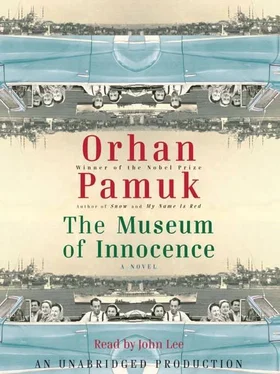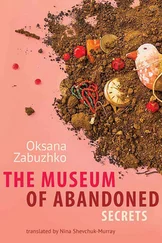“I don’t believe in séances, either,” said Sibel. “But if I’m invited to one, I never pass it up, because I like watching the games people play, and seeing what they fear.”
“But if you love someone, and you miss them terribly, which would you do?” asked Füsun. “Would you gather up your friends and try to summon his spirit, or would you look for some old possession of his, like a cigarette box?”
As Sibel groped for a polite answer, Füsun shot up out of her seat and, reaching over to the next table, picked up a handbag, which she placed in front of us. “This handbag reminds me of my embarrassment… my shame for having sold you a fake,” she said.
When it was on Füsun’s arm earlier I had not recognized it as “that” bag. But hadn’t I bought it in the Şanzelize Boutique from Şenay Hanım, shortly before the happiest moment in my life, and, after having run into Füsun in the street, hadn’t I taken it back with us to the Merhamet Apartments? Just yesterday that talismanic Jenny Colon bag was still there. How could it be here now? I was like some spectator dumbfounded by a juggler’s trick, and my head was spinning.
“It looks very good on you,” said Sibel awkwardly. “So lovely with the orange, and your hat, that when I first saw it I felt jealous. I was sorry I’d returned it to you. How beautiful you are!”
It occurred to me that Şenay Hanım must have had more than one fake Jenny Colon bag in stock. Having sold one to me, she might have put another in the window, and even lent a third to Füsun for this evening.
“After you realized that the bag was a fake, you stopped coming to the Şanzelize,” said Füsun, smiling graciously at Sibel. “This upset me, because of course you were right.” Opening the bag, she showed us the inside. “Our craftsmen make excellent fakes of European products, bless them, but never enough to fool someone with your experienced eye. But now I must say something.” She swallowed and fell silent, and I feared she was going to cry. But she pulled herself together, and with a frown she recited the speech that she must have rehearsed at home. “For me, it’s not in the least important whether something is or isn’t a European product. And it’s not in the least important to me either if a thing is genuine or fake. If you ask me, people’s dislike of imitations has nothing to do with fake or real, but the fear that others might think they’d ‘bought it cheap.’ For me, the worst thing is when people care about the brand and not the thing itself. You know how there are some people who don’t give importance to their own feelings, and care only about what other people might say”-here she glanced in my direction. “This handbag will always remind me of tonight. I congratulate you. It’s been an evening I’ll never forget.” She rose to her feet, and as she squeezed our hands, my darling girl kissed us each on the cheek. As she turned to leave, she noticed Zaim approaching the next table and she turned back to Sibel. “Zaim Bey is a very good friend of your fiancé, isn’t he?” she asked.
“Yes, they’re very close,” said Sibel. As Füsun took her father’s arm, Sibel turned to me and asked, “What did she mean by that question?” but there was no contempt for Füsun in her expression. I saw instead something akin to excitement, even adoration.
As Füsun headed slowly for the stairs, flanked by her mother and father, I watched her from behind with love and pride.
Zaim came and sat down beside me. “You know, at that Satsat table behind us, they’ve been having quite a laugh at your expense all evening,” he said. “As your friend, I thought you should know.”
“You must be joking! What exactly could they be laughing about?”
“Well, I didn’t hear it directly, of course. Kenan told Füsun. And she told me… And she was quite upset, too. Apparently it’s general knowledge at Satsat that every night at quitting time, you and Sibel would meet there for a romp on the divan in the corner office. This is what all the snickering was about.”
“What’s happened now?” asked Sibel as she came back to us. “You’re depressed again, aren’t you?”
I DID NOT sleep at all that night. In fact, Sibel and I had been meeting at Satsat only rarely, but this was hardly an extenuating circumstance in the indictment I feared would cost me Füsun. Toward dawn I dozed off briefly. The moment I woke up I shaved and went for a walk. I took the long way back, passing in front of the Technical University ’s 115-year-old Taşkışla Building, where Füsun was takıng her exam. Around the door, through which Ottoman soldiers sporting fezzes and pointed mustaches had once passed on their way to drill, mothers in head-scarves and chain-smoking fathers sat in rows waiting for their children. Some were reading newspapers; others were chatting or looking blankly up at the sky. I could not see Aunt Nesibe among them. Between the windows in the stone facade, sixty-six years on, you could still see the bullet holes left by the Action Army upon the deposition of Sultan Abdülhamit. Fixing my eyes on one of those high windows, I said a prayer, asking God to help Füsun answer the questions, and to send her skipping joyously back to me when the exam was over.
But Füsun did not come to the Merhamet Apartments that day. I told myself her anger would pass. As the strong June sun filtered through the curtains and the room grew steadily hotter, I waited two hours past our usual meeting time. It hurt to look at the empty bed, so I went out for another walk. As I walked through the park, past soldiers idly killing time and children feeding the pigeons under the gaze of their families, and people reading their newspapers on the benches at the edge of the sea or watching the ships go by, I tried to convince myself that Füsun would come at the usual time the next day. But she did not come the next day, or the four days that followed.
Every day I went to the Merhamet Apartments at the customary hour, to begin my wait. Having realized that getting there early only aggravated my pain, I resolved not to arrive before five minutes to two. I would go into the apartment trembling with impatience, and during the first ten or fifteen minutes hopeful anticipation would ease the pain, an excitement wreathing my head down to the tip of my nose even as my heart ached and my stomach cramped. From time to time I would part the curtains to look down at the street and inspect the rust on the lamppost in front of the entrance, and then I’d tidy the room a bit. I would listen to footsteps passing one floor below, and from time to time I would hear high heels clicking past in that decisive way of hers. But they would continue on without slowing down, and I would realize with pain that the woman who had entered the building, lightly shutting the door behind her in such a familiar way, was in fact someone else.
I have here the clock, and these matchsticks and matchbooks, because the display suggests how I spent the slow ten or fifteen minutes it took me to accept that Füsun was not coming that day. As I paced the rooms, glancing out the windows, stopping in my tracks from time to time, standing motionless, I would listen to the pain sluicing within me. As the clocks in the apartment ticked away, my mind would fixate on the seconds and the minutes to distract itself from the agony. As the appointed hour neared, the sentiment “Today, yes, she’s coming, now” would bloom inside me, unbidden, like spring flowers. At such moments I wanted time to flow faster so that I could be reunited with my lovely at once. But those minutes would never pass. For a moment, in a fit of great clarity, I would understand that I was fooling myself, that I did not want the time to flow at all, because Füsun might never come. By two o’clock I was never sure whether to be happy that the hour had arrived, or sad that with every passing minute her arrival was less likely, and the distance between me and my beloved would grow as that between a passenger on a ship leaving port and the one he had left behind. So I would try to convince myself that not so very many minutes had passed, toward this end I would make little bundles of time in my head. Instead of feeling the pain every second of every minute, I resolved to feel it only once every five! In this way I would take the pain of five discrete minutes and suffer it all in the last. But this too was for naught when I could no longer deny that the first five minutes had passed-when I was forced to accept that she was not coming, the forestalled pain would sink into me like a driven nail. In the subsequent desperation I would repeat the exercise, struggling to tell myself that Füsun had often been ten or fifteen minutes late for our meetings, an assertion I was not really sure of, but which allowed me a respite at least for four-fifths of the next five-minute bundle, and hope would return, as I dreamed that in a moment’s time she would ring the bell, that in just a moment she would be there with me, as suddenly as the second time we met. I would imagine what I’d do when she rang the bell-whether I would be angry at her for not having come for so many days, or whether I would forgive her on sight. These fleeting dreams would mix with memories when my eyes lit upon this teacup, from which Füsun drank during our first encounter, or upon this little old vase that she picked up for no reason while impatiently pacing the apartment. After fending off the ever more hopeless awareness that the fourth and fifth five-minute bundles had come and gone, my reason would force me to accept that on that day Füsun would not be coming, and at that moment the agony inside was such that I could do nothing but throw myself like an invalid onto the bed.
Читать дальше












